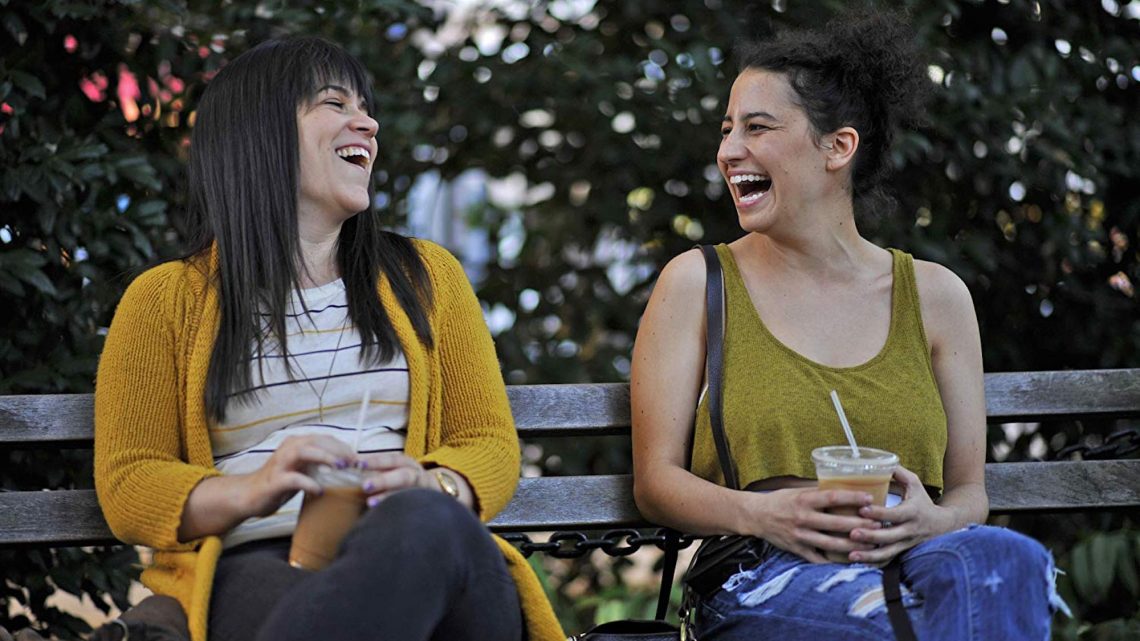
‘Broad City’ Made It Respectable to Be a Reckless, Messy Queen
March 29, 2019When we first dropped in on the lives of Ilana Wexler and Abbi Abrams back in the 2014 pilot of Broad City, the then-22-and-26-year-olds, respectively, were drumming on buckets in Madison Square Park, trying to outshine a breakdancer to make enough money for Lil Wayne tickets. When that didn’t work, they ducked behind an alley to smoke a joint. Later, still on the hunt for concert money, they answer an online ad for housecleaners and get bamboozled by a pervy man (played by Fred Armisen) who ends up in a diaper pretending to be a baby and refuses to pay. In the end, the besties turn it all around by stealing his fur coats and wearing them while getting wasted on a stoop, proclaiming their baller street sesh to be much better than any Weezy concert.
Looking back, there couldn’t have been any other opening to a show that was the first to truly rep for scrappy, silly, carefree young women, and to genuinely suggest that they’re doing life their way, whether that's right or wrong. Now that the show just wrapped its fifth and final season on Thursday, it’s a great time to reflect on why Broad City was such a breath of fresh air to so many.
Premiering just two years before Broad City, Girls was—at the time—the biggest show on TV portraying a group of deeply messy twentysomethings trying to build a life in New York. But while Girls expertly conveyed the whirling existentialism of ‘adulting,’ its four central characters’ immaturity was framed cynically rather than mined as pure comedic gold. Hannah Horvath’s self-centeredness or Marnie Michaels’s controlling perfectionism were traits anyone rooting for them wished they’d get over. And the character with the most prominent wild streak, Jessa Johansson, ended up having some serious issues with self-sabotage and backstabbing, which barely gave viewers time to revel in her dry sense of humor and free-spiritedness.
But when Abbi and Ilana stepped in, their reckless, freewheeling lifestyle wasn’t framed as something that needed to change—it was the name of the game, even aspirational.
Broad City also stands out in the long tradition of shows about *women in the city* because pioneering sitcoms from the 90s and 2000s centered female leads that largely had their act together—let’s call it, the Bad Bitches Only era. From Living Single ('93–'98) to Friends (‘94–’04), Sex and the City (‘98–’04) and Girlfriends (‘00–’08), this era was full of women with very mature jobs, music-video-worthy apartments, bomb-proof friend groups, and a number of fairytale on-again-off-again relationships that usually culminated in marriage.
But importantly, the few sillier or eccentric characters of that era that are more Abbi and Ilana’s speed were tokenized as class clowns. Friends often played up Phoebe Buffay’s goofy side with airhead lines to make her the butt of jokes, and leaned on her “weirdness” for comedic relief, like the running gag of signature song “Smelly Cat,” performed regularly during her gigs at Central Perk. On Girlfriends, bohemian zen queen Lynn Searcy had a similar role. She was treated like an unserious, hippie-dippie type by her other friends, leading to arguments between her and the grown-’n'-sexy protagonist Joan Clayton (played by Tracee Ellis Ross). These characters didn’t have the same high-powered careers or long, winding love stories that their more “mature” friends did, which made their lifestyles seem less worthy of admiration, and, somehow, less womanly.
With Broad City, Abbi and Ilana are an absurd, creative, off-the-rails duo—but you respect them for it. You want to get in there and wild out with them. In the show, young women can play, fail, and follow their true desires with no shame. Whether it’s pretending to play a concert in a drum store or ogling street basketball players through a fence, it starts to feel like they may actually be making the right moves. And perhaps most importantly, their world doesn’t come crashing down because of it. They live very full, nearly uninhibited lives with close friends and family; loving romantic partners (including Ilana’s longterm dentist bae Lincoln Rice, played by Hannibal Buress); and they have spikes of career success, like Ilana’s stint as a “corporate overlord” of the interns at Deals Deals Deals! in the second episode of season two. Their setbacks at work or in their love life take a backseat to the main focus on the adventures in their friendship.
Broad City did away with the naive airhead trope, proving that female-led, goofball comedy can also be intellectual. As political junkies in real life, Glazer and Jacobson’s characters weave political facts and social justice lingo into their witty exchanges. The show uses exaggerated humor to cleverly comment on serious issues, like addressing women’s Trump-era depression by sending Ilana to a magical sex therapist who pinpoints the political climate’s toll on her body. And Hillary Clinton’s appearance on the show during her 2016 presidential campaign was a big flex, too (another point for the wild ones!). The show’s meta premise—in which the actresses portray characters with their own first names, and very similar personalities to themselves—also allows the success of their IRL careers to serve as proof that women like them have real value in this world. The show questions why women should strive to fit into mainstream molds in society at all when Abbi and Ilana are getting along just fine following their wackiest whims.
But in its final season, the show seriously grappled with what it looks like for the queens of adult “immaturity” to finally grow up. Amid their business-as-usual shenanigans, Ilana buckles down to apply to grad school programs for psychology and consciously uncouples with Lincoln (teardrop), while Abbi dates an older female doctor and makes the tough choice to leave her city adventures behind for art school in Boulder, Colorado. There are moments in the final season when they start to feel insecure about their personalities, like when Abbi gets dumped by her doctor bae for being too childish and tries to dress like a 60s housewife to compensate. But by the time they realize their days together are numbered, they’re back on the adventure wave, bringing the plot full circle to missing yet another Lil Wayne concert.
The show’s resolution, which shows that they can take the next big steps in their lives while keeping their wild personalities on and popping, stays true to what Broad City contributed to our culture. There’s much more for women to strive for now than being marriage material, or even “adulting” in the Type A sense of the word. Women that wear dog hoodies, engage in some pegging, goof off, or do all the hallucinogens are no less womanly or capable of success. They made the case that what’s worth striving for in life is sticking close to the people and the places that let you bring all of yourself to the table.
As hard as it was for the two women to find the words to say goodbye to each other throughout the show’s finale, Abbi hit the nail on the head in their last moment, saying, “I don’t even feel like I was alive before I met you. You taught me how to do it, dude.” Ilana paused, “Well, you’re alive as hell now.”
Sign up for our newsletter to get the best of VICE delivered to your inbox daily.


